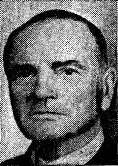Stanley Holmes, 1st Baron Dovercourt
| The Right Honourable The Lord Dovercourt | |
|---|---|
 | |
| Chairman of the National Liberal Party | |
|
In office 1946–1947 | |
| Preceded by | James Henderson-Stewart |
| Succeeded by | John Maclay |
| Member of Parliament for Harwich | |
|
In office 14 November 1935 – 18 January 1954 | |
| Preceded by | John Pybus |
| Succeeded by | Julian Ridsdale |
| Member of Parliament for North East Derbyshire | |
|
In office 14 December 1918 – 15 November 1922 | |
| Preceded by | George Robert Harland Bowden |
| Succeeded by | Julian Ridsdale |
| Personal details | |
| Born |
Joseph Stanley Holmes 31 October 1878 Marylebone, Middlesex |
| Died |
22 April 1961 (aged 82) Marylebone, London |
| Nationality | British |
| Political party | National Liberal |
| Other political affiliations | Liberal |
| Spouse(s) | Eva Gertrude |
| Alma mater | City of London School |
Joseph Stanley Holmes, 1st Baron Dovercourt (31 October 1878 – 22 April 1961) was a British chartered accountant, businessman and Liberal Party politician, who later served as a Liberal National Member of Parliament.
Background and education
Holmes was born in Marylebone, Middlesex, the son of Horace G. Holmes, JP. He was educated at the City of London School.[1]
Career
Holmes was a chartered accountant and company director. He served as vice-president of the Building Societies Association and was a member of the London County Council 1910 to 1919. He was elected Liberal Member of Parliament for North East Derbyshire at the 1918 general election, but narrowly lost the seat at the 1922 general election.[2] The initially declared majority was only 5 votes, and an electoral petition was lodged. The petition was dismissed when a recount found a higher majority of 15.[2]
Holmes then stood unsuccessfully in Dunbartonshire at the 1923 general election,[3] and in Cheltenham at the 1924 election.[4] He finally returned to the House of Commons after a thirteen-year absence at the 1935 general election, when he was elected for Harwich as a Liberal National.[5] He held the seat until 1954, sitting later as a 'National Liberal and Conservative'. He introduced as Private Member's Bills the Inheritance (Family Provision) Act 1938 and the Coast Protection Act 1939. On 18 January 1954 he was elevated to the peerage as Baron Dovercourt, of Harwich in the County of Essex.[6]
Personal life
Lord Dovercourt married Eva Gertrude, daughter of Thomas Bowley, in 1905. He died in Marylebone, London, in April 1961, aged 82. The barony became extinct on his death.[1]
References
- 1 2 thepeerage.com Joseph Stanley Holmes, 1st and last Baron Dovercourt
- 1 2 Craig, F. W. S. (1983) [1969]. British parliamentary election results 1918–1949 (3rd ed.). Chichester: Parliamentary Research Services. p. 324. ISBN 0-900178-06-X.
- ↑ Craig, op. cit., page 622
- ↑ Craig, op. cit., page 115
- ↑ Craig, op. cit., page 352
- ↑ "No. 40078". The London Gazette. 19 January 1954. p. 447.
External links
- Hansard 1803–2005: contributions in Parliament by Stanley Holmes
| Party political offices | ||
|---|---|---|
| Preceded by James Henderson-Stewart |
Chairman of the National Liberal Party 1946–1947 |
Succeeded by John Maclay |
| Parliament of the United Kingdom | ||
| Preceded by George Robert Harland Bowden |
Member of Parliament for North East Derbyshire 1918 – 1922 |
Succeeded by Frank Lee |
| Preceded by John Pybus |
Member of Parliament for Harwich 1935–1954 |
Succeeded by Sir Julian Ridsdale |
| Peerage of the United Kingdom | ||
| New creation | Baron Dovercourt 1954–1961 |
Extinct |